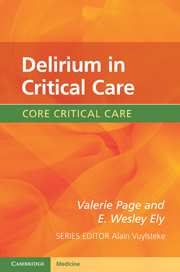Book contents
- Frontmatter
- Contents
- Foreword
- Delirium, a patient testimony
- 1 What is delirium in critical care?
- 2 How common is delirium in critical care?
- 3 What does delirium look like in critical care?
- 4 Delirium in critical care: how does it happen?
- 5 Delirium: what causes it? Risk factors
- 6 Delirium in critical care: why is it important?
- 7 Delirium in critical care: how do we diagnose it?
- 8 How to prevent delirium?
- 9 Treatment of delirium in critical care
- 10 Mental capacity and restraints
- 11 End-of-life care
- 12 What is the future?
- Selected references
- Index
- References
7 - Delirium in critical care: how do we diagnose it?
Published online by Cambridge University Press: 05 December 2011
- Frontmatter
- Contents
- Foreword
- Delirium, a patient testimony
- 1 What is delirium in critical care?
- 2 How common is delirium in critical care?
- 3 What does delirium look like in critical care?
- 4 Delirium in critical care: how does it happen?
- 5 Delirium: what causes it? Risk factors
- 6 Delirium in critical care: why is it important?
- 7 Delirium in critical care: how do we diagnose it?
- 8 How to prevent delirium?
- 9 Treatment of delirium in critical care
- 10 Mental capacity and restraints
- 11 End-of-life care
- 12 What is the future?
- Selected references
- Index
- References
Summary
Introduction
How to detect delirium in the critically ill patients even when they are sedated? Don't worry, it is easy… but only if you look for it. Most patients present with hypoactive delirium, a lethargic apparently co-operative patient; but just scratch the surface and you will find an inattentive patient with altered mental status and disorganized thinking.
A 69-year-old patient was recovering from an infection of his urinary tract that had led to major sepsis. He still required haemofiltration intermittently and consequently was only mobilizing slowly. He appeared as a quiet and co-operative patient, but was extremely reluctant to eat. The clinicians and dietician made sure he was not constipated, and prescribed nutritional supplements while encouraging him to eat. The team suspected he was depressed. It was only after discharge, when he was seen in the follow-up clinic, that he told the consultant that he had been frightened whilst on the unit, believing that the staff were feeding him up so they could eat him for Christmas! The ICU staff had no idea.
Delirium screening is recommended routinely for all critically ill patients. It doesn't need any equipment, there is no risk to the patient and takes around 2 minutes (if that),… how many interventions in ICU are so quick and easy?
- Type
- Chapter
- Information
- Delirium in Critical Care , pp. 109 - 138Publisher: Cambridge University PressPrint publication year: 2011
References
- 2
- Cited by

